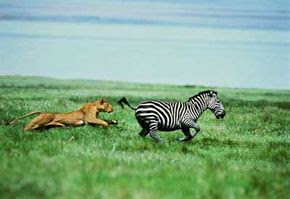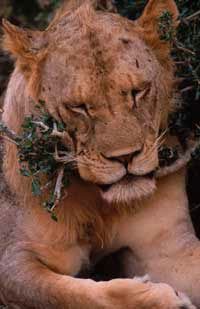Quck answer
Yes, there is such a thing as a man-eating lion. These lions are typically old, injured, or have lost their normal prey due to human encroachment on their habitat. Man-eating lions are responsible for a small percentage of lion attacks on humans, but they can cause significant damage to human populations near their territory. Conservation efforts, such as habitat preservation and careful monitoring of lion populations, can help prevent man-eating lion incidents.
Wild Animals

Image Gallery: Big Cats Lions typically hunt animals such as zebras, buffalos, and gazelles. Check out more pictures of big cats.
S Purdy Matthews/Getty Images
Man-eating lions are not just a figment of Hall & Oates’ imagination. Lions, known as the king of the jungle, have been known to develop a taste for human flesh. This has led to stories of lions attacking groups of people in Africa.
However, like sharks, lions may be misunderstood when it comes to their interactions with humans. In most cases, lions prefer to scavenge carcasses and mooch off other animals’ hard work for their food [source: African Wildlife Foundation]. They also hunt for prey such as buffalos, gazelles, and zebras. However, there are circumstances where some lions will choose humans as their victims.
The most famous case of man-eating lions took place in 1898. Two male lions, later named Ghost and Darkness, attacked Ugandan railroad workers. The building project had reached the Tsavo River in Kenya, where the now infamous Tsavo lions resided. According to reports, the lions killed 135 African and Indian railroad laborers, sometimes dragging them from their tents while they slept. The violence escalated to the point where construction was halted. It took Lt. Col. John Henry Patterson nine months to track down and shoot the two lions, effectively ending the killing spree [source: Bernstein].
The Chicago Field Museum purchased the lion skins from Patterson for $5,000. The lions are now on display in stuffed form. Further investigation into the Tsavo event showed that there were records for only 28 deaths [source: Holden]. Despite the lower casualty list, the Tsavo lions are still known as the man-eaters of Africa and are found in the protected eastern area of the Kenya Tsavo National Park.
But the Tsavo lions are not the only ones known to attack large numbers of people. In the 1930s, the Njombe district in southern Tanzania suffered an estimated 1,500 deaths from lion attacks [source: Frank et al]. Since 1990, at least 600 people have died in Africa for the same reason [source: Frank et al].
So what turns these beasts into man-eaters? Find out on the next page.
Why Do Lions Attack Humans?

A maneless Tsavo lion.
Robert Caputo/Getty Images
Some people have suggested that the Tsavo lions were a different species of big cat that lived during the Pleistocene epoch. For instance, the males lack manes and are often larger than average lions. Another theory suggested that the Tsavo lions’ aggression was due to elevated testosterone levels [source: Newbart].
However, these theories have not been confirmed. The Tsavo lion’s lack of mane is likely due to adaptation to the hotter weather since fuller, darker manes usually correlate to cooler, wetter climates [source: West and Packer]. This makes sense since the Tsavo region has little rainfall and high average temperatures. As for their relative size, the lions in the area are not abnormally large as a whole, and research has not confirmed the possibility of increased testosterone [source: Newbart].
Experts suggest that external conditions influence the predatory behavior of “man-eaters of Africa” and other groups of lions that have attacked human settlements in modern times, instead of biological instinct. The population of lions in Africa has been declining, while the human population has been on the rise, leading to an increase in lion attacks. Lions may attack humans due to altered habitats that impact their usual food sources, leading to prey switching, where they change their diets to accommodate the loss of their usual food sources. Humans may also serve as easier prey for old or injured lions, and the habit of man-eating can be passed down to their cubs. The development of land into arable plots and raising of livestock has also impacted the amount of available prey for lions, leading to the perfect storm in eastern African countries like Ethiopia, Tanzania, and Mozambique. Despite not being a natural practice, lions can become man-eaters out of necessity due to survival instinct.
Additional Information
Related Articles on HowStuffWorks
- Insight into Safaris
- Understanding Animal Migration
- 7 Animals with Long-Distance Communication Abilities
- Exploring the World of Saber-tooth Cats
- Discovering the World of Lions
- Discovering the World of Tigers
- Test Your Knowledge with Our Cat Quiz
More Useful Links
- Animal Planet — Wild 100
- African Wildlife Foundation
- Chicago’s Field Museum — Lions of Tsavo
Sources Cited:
- Bernstein, Richard. “In Scientific Pursuit of Africa’s Man-Eating Lions.” The New York Times. July 24, 2002. (July 7, 2008)http://query.nytimes.com/gst/fullpage.html?res=9401EFDB1538F937A15754C0A9649C8B63
- Caputo, Philip. “Maneless in Tsavo.” National Geographic. April 2002. (July 7, 2008)http://ngm.nationalgeographic.com/ngm/0204/feature2/index.html?fs=animals-panther.nationalgeographic.com
- Dickinson, Daniel. “Toothache ‘made lion eat humans’”. BBC. Oct. 19, 2004. (July 7, 2008)http://news.bbc.co.uk/2/hi/africa/3756180.stm
- Frank, Laurence et al. “Lions, Conflict and Conservation in Eastern Africa.” Felid Conservation and Biology Conference. January 2006. (July 7, 2008)http://www.felidae.org/JOBURG/LIONS,%20CONFLICT%20AND%20CONSERVATION.doc
- Holden, Constance. “The man-eating habit.” Science. Jan. 31, 2003.
- Kvinta, Paul. “Man-Eating Lions: Stalking the Spirit Lions.” National Geographic Adventure. October 2006. (July 7, 2008)http://www.nationalgeographic.com/adventure/photography/africa/tanzania/lions-maneating.html
- Malkin, Carolyn A. “Humans too tasty to resist.” New Scientist. Feb. 15, 2003.
- Newbart, Dave. “Mystery of the Man-Eating Lion.” National Wildlife. August/September 2004. (July 7, 2008)http://www.nwf.org/nationalwildlife/article.cfm?issueID=69&articleID=956
- Patterson, Bruce D. “The Lions of Tsavo: Exploring the Legacy of Africa’s Notorious Man-Eaters.” McGraw-Hill Professional. 2004. (July 7, 2008)http://books.google.com/books?id=JaJs5YlW-RIC
- West, Peyton M. and Packer, Craig. “Sexual Selection, Temperature and the Lion’s Mane.” Science. Aug. 23, 2002. (July 7, 2008)http://www.sciencemag.org/cgi/content/abstract/297/5585/1339
FAQ
1. Is it possible for a lion to eat a human?
Yes, it is possible for a lion to eat a human. However, it is not common for lions to prey on humans as they usually hunt for their natural prey like zebras, antelopes, and buffaloes.
2. Is there such a thing as a man-eating lion?
Yes, there have been reported cases of man-eating lions in the past. These lions may have developed a taste for human flesh after attacking and killing humans.
3. What makes a lion turn into a man-eater?
There are a few reasons why a lion may turn into a man-eater. One reason could be due to habitat loss, where the lion’s natural prey has disappeared and they are forced to look for alternative sources of food. Another reason could be due to an injury or illness that makes it difficult for the lion to hunt its natural prey.
4. How many people are killed by lions each year?
According to the International Union for Conservation of Nature (IUCN), there are an estimated 80 to 100 lion attacks on humans each year, with around 20 of these attacks resulting in fatalities.
5. What should you do if you encounter a lion?
If you encounter a lion, it is important to stay calm and avoid running away as this may trigger the lion’s hunting instincts. Instead, try to make yourself look as big and intimidating as possible by raising your arms and making loud noises.
6. Can lions be trained not to attack humans?
Lions can be trained not to attack humans, but it is a difficult and risky process. It requires a lot of time and effort, and there is always a risk that the lion may revert back to its natural instincts and attack humans.
7. Are there any lions in captivity that have killed humans?
Yes, there have been reported cases of captive lions killing humans. These lions may have been mistreated, abused, or provoked by humans, which led to the attack.
8. How do humans protect themselves from man-eating lions?
Humans can protect themselves from man-eating lions by avoiding areas where lions are known to be present, staying in groups when in lion territory, and carrying deterrents like pepper spray or air horns.
9. Are man-eating lions a threat to conservation efforts?
Man-eating lions can be a threat to conservation efforts as they may cause fear and hostility towards lions, which could lead to retaliatory killings by humans. It is important for conservationists to address the issue of man-eating lions and work towards finding solutions to prevent these attacks.
10. What is being done to prevent man-eating lion attacks?
Conservationists are working towards preventing man-eating lion attacks by studying lion behavior, educating the public on how to avoid encounters with lions, and setting up measures to protect both humans and lions.
11. Should lions be killed if they become man-eaters?
Killing lions that become man-eaters is a controversial issue. While some argue that it is necessary to protect human lives, others believe that there are alternative solutions that can be implemented, such as relocating the lions to areas where they are less likely to encounter humans.





Leave a Reply